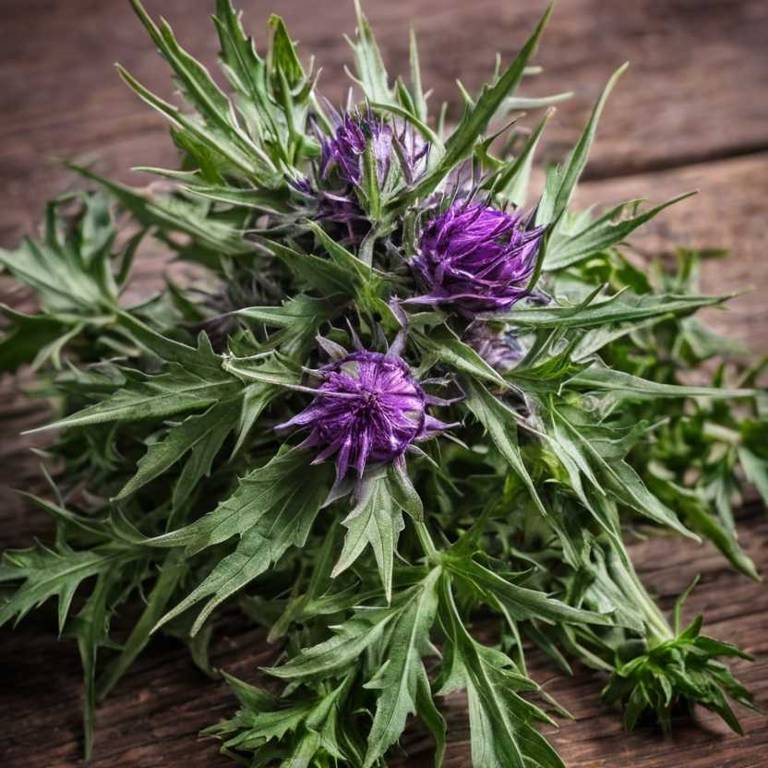By Leen Randell
Updated: Jul 06, 2024
10 Health Benefits Of Silybum Marianum (Milk Thistle)

Silybum marianum, also known as milk thistle, has health benefits such as reducing liver damage and inflammation.
Its medicinal properties, silymarin and silibinin, exhibit antioxidant and anti-inflammatory properties, which protect the liver from toxins and promote healing. This can benefit individuals with liver disease, such as hepatitis or cirrhosis, by improving symptoms and quality of life.
Additionally, milk thistle has also been studied for its potential to alleviate symptoms of gallbladder disease, digestive issues, and even certain cancers.
This article explains in details the 10 best health benefits of Silybum marianum.
1. Improves liver function
Silybum marianum improves liver function because it contains a unique compound called silymarin.
This potent flavonoid complex has been shown to have antioxidant and anti-inflammatory properties, which help protect the liver from damage caused by toxins, heavy metals, and other harmful substances.
Silymarin also stimulates liver regeneration and reduces oxidative stress, ultimately promoting healthy liver function and alleviating symptoms of liver disease such as jaundice, fatigue, and abdominal pain.
2. Supports liver detoxification
Silybum marianum supports liver detoxification because it contains silymarin, a bioflavonoid complex that has been shown to protect the liver from damage and promote its natural detoxifying processes.
Silymarin works by enhancing glutathione production, increasing the liver's ability to neutralize toxins, and reducing oxidative stress and inflammation in the liver cells.
This helps to maintain healthy liver function and supports the body's natural elimination of waste and toxins.
3. Protects liver cells from damage
Silybum marianum protects liver cells from damage because of its unique flavonoid complex called silymarin.
This potent antioxidant binds to damaged liver cell membranes, preventing further injury and promoting cellular regeneration. Silymarin also inhibits the formation of reactive oxygen species (ROS) that can harm liver cells, while enhancing the activity of glutathione, a crucial detoxifying enzyme in the liver.
By safeguarding liver cells from oxidative stress, silymarin helps maintain overall liver health and function.
4. Reduces liver inflammation
Silybum marianum reduces liver inflammation because of its potent antioxidant and anti-inflammatory properties.
The plant's active compound, silymarin, has been shown to inhibit the production of pro-inflammatory cytokines and reduce oxidative stress in liver cells, thereby alleviating inflammation and damage.
Additionally, silymarin has been found to improve liver function and protect against toxic substances that can cause liver injury, making it a natural and effective treatment for various liver disorders.
5. Helps treat liver diseases
Silybum marianum helps treat liver diseases because of its unique active compounds called silymarins.
These powerful flavonoids have been shown to protect the liver from damage caused by toxins, viruses, and other factors that can lead to inflammation and scarring.
Silymarins also promote liver regeneration and reduce oxidative stress, making milk thistle a natural and effective adjunct therapy for various liver conditions, including cirrhosis, hepatitis, and fatty liver disease.
6. Lowers cholesterol levels
Silybum marianum lowers cholesterol levels because of its ability to stimulate the production of bile in the liver.
This increased bile flow helps to remove excess cholesterol from the bloodstream, thereby reducing overall cholesterol levels.
Additionally, silymarin, a flavonoid compound found in milk thistle, has been shown to inhibit the absorption of dietary cholesterol into the bloodstream, further contributing to its cholesterol-lowering effects.
7. Reduces insulin resistance
Silybum marianum reduces insulin resistance because of its potent antioxidant and anti-inflammatory properties.
The flavonoids present in milk thistle, such as silymarin, have been shown to improve insulin sensitivity by inhibiting the formation of advanced glycation end-products (AGEs), which contribute to insulin resistance.
Additionally, silymarin has been found to reduce inflammation in pancreatic islet cells, thereby improving glucose tolerance and reducing the risk of developing type 2 diabetes.
8. Prevents gallstone formation
Silybum marianum prevents gallstone formation because of its unique bioactive compounds, specifically silymarin.
This flavonoid complex has been shown to possess choleretic properties, stimulating bile secretion and reducing the concentration of cholesterol in bile, thereby preventing stone formation. Additionally, silymarin's antioxidant effects help protect against oxidative stress, which can contribute to gallstone development.
By modulating these biochemical pathways, milk thistle may offer a natural adjunct therapy for mitigating gallstone risk.
9. Protects against oxidative stress
Silybum marianum protects against oxidative stress because of its unique flavonoid and lignan composition.
The plant's silymarin complex is particularly effective in scavenging free radicals and chelating metal ions, thereby reducing the formation of reactive oxygen species (ROS). Additionally, silymarin inhibits lipid peroxidation and upregulates antioxidant enzymes, providing a multi-faceted defense against oxidative damage.
This natural ability to counteract oxidative stress makes milk thistle a valuable adjunct in the prevention and treatment of various diseases.
10. Boosts immune system
Silybum marianum boosts immune system because of its potent antioxidant and anti-inflammatory properties.
The plant's active compound, silymarin, has been shown to increase the production of white blood cells, which are crucial in fighting off infections. Additionally, silymarin helps to reduce oxidative stress and inflammation, creating a favorable environment for the immune system to function optimally.
This results in improved resistance to diseases and faster recovery from illnesses.